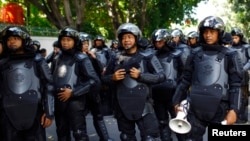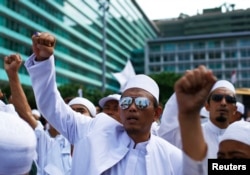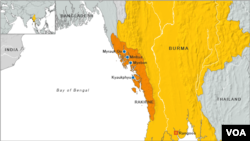BANGKOK —
Police in Indonesia's capital, Jakarta, have arrested two men for an alleged plot to bomb the embassy of Burma to protest how the country treats Muslims. A terrorism analyst says the incident shows Burma's sectarian unrest has spread outside the country and, if left unchecked, could further encourage extremists.
Truckloads of Indonesian police were deployed around Burma's embassy in Jakarta Friday after they stopped what could have been a deadly attack. An elite anti-terror squad late Thursday arrested two men armed with explosives and alleged ties to terrorist networks and recent attacks on police.
Police say the men confessed to a plot.
General Brigadier Boy Rafli Amar, Indonesia's national police spokesman, said police ambushed the suspects as they were riding a motorcycle in central Jakarta.
Police found five active bombs that could hurt and injure people, he said. Police cannot say whether the bombs could have serious implications, he said, but clearly they could injure people.
Police found more explosive material at the suspects' residence where authorities took a woman and a baby into custody. Police reinforcements were also sent to the house of Burma's ambassador to Indonesia.
Extremists from the Indonesian branch of Hizbut Tahrir last year protested outside Burma's embassy and called for jihad, or holy war.
Indonesia's extremists have taken up the cause of Muslims in Burma, also known as Myanmar, said Rohan Gunaratna, head of the International Center for Political Violence and Terrorism Research in Singapore.
"There [have] been sustained calls on the part of terrorist leaders in Indonesia, including Abu Bakar Bashir, the leader of JI [Jemaah Islamiyah] and JAT [Jemaah Anshorut Tauhid], the two principle groups, to wage jihad against Myanmar, " said Gunaratna. "So, in many ways these attempts are a response to the call by Abu Bakar Bashir, and by other terrorist leaders, that they must attack the interests of Myanmar."
Abu Bakar Bashir is serving a 15-year prison term in Indonesia for funding terrorism. From prison, he published a letter last year threatening to wage war if Burma continued to harm Rohingya Muslims.
The Rohingya are a minority in Burma's western Rakhine state who are not recognized as citizens, although many have been living there for generations. They have few rights and are considered by the United Nations as one of the world's most persecuted minorities.
Sectarian clashes between the Buddhist Rakhine and Muslims in June and October left 200 people dead, most of them Rohingya.
Human Rights Watch says Burma officials, security and monks in Rakhine fomented ethnic cleansing. The rights group cited evidence of mass graves that may have been used to hide a higher number of Muslims killed.
Buddhist on Muslim violence has since spread across the country, with at least 45 killed and numerous mosques, businesses and homes burned to the ground. Meanwhile, Burma authorities have failed to stop Buddhist extremists, including some senior monks, from preaching hatred against Muslims.
Burma needs to resolve the tensions before long-defunct terrorist groups are able to capture public support and build back their capabilities, Gunaratna said.
"And there were two Rohingya groups that were working with Al Jamaa al-Islamiya Indonesia, which is a terrorist group, called Rohingya Solidarity Organization and the Arakan Rohingya National Organization," Gunaratna added. "And, at this point these groups are very…operating at a very low level. And, it is so important that these issues are resolved so that these threat groups do not get a new life."
A Burma government-appointed commission this week recommended doubling security and efforts to assimilate Muslims in Rakhine state to prevent further unrest. But the commission's report failed to hold anyone accountable for the violence and was criticized for putting part of the blame for sectarian violence on high Muslim birth rates.
Truckloads of Indonesian police were deployed around Burma's embassy in Jakarta Friday after they stopped what could have been a deadly attack. An elite anti-terror squad late Thursday arrested two men armed with explosives and alleged ties to terrorist networks and recent attacks on police.
Police say the men confessed to a plot.
General Brigadier Boy Rafli Amar, Indonesia's national police spokesman, said police ambushed the suspects as they were riding a motorcycle in central Jakarta.
Police found five active bombs that could hurt and injure people, he said. Police cannot say whether the bombs could have serious implications, he said, but clearly they could injure people.
Police found more explosive material at the suspects' residence where authorities took a woman and a baby into custody. Police reinforcements were also sent to the house of Burma's ambassador to Indonesia.
Extremists from the Indonesian branch of Hizbut Tahrir last year protested outside Burma's embassy and called for jihad, or holy war.
Indonesia's extremists have taken up the cause of Muslims in Burma, also known as Myanmar, said Rohan Gunaratna, head of the International Center for Political Violence and Terrorism Research in Singapore.
"There [have] been sustained calls on the part of terrorist leaders in Indonesia, including Abu Bakar Bashir, the leader of JI [Jemaah Islamiyah] and JAT [Jemaah Anshorut Tauhid], the two principle groups, to wage jihad against Myanmar, " said Gunaratna. "So, in many ways these attempts are a response to the call by Abu Bakar Bashir, and by other terrorist leaders, that they must attack the interests of Myanmar."
Abu Bakar Bashir is serving a 15-year prison term in Indonesia for funding terrorism. From prison, he published a letter last year threatening to wage war if Burma continued to harm Rohingya Muslims.
The Rohingya are a minority in Burma's western Rakhine state who are not recognized as citizens, although many have been living there for generations. They have few rights and are considered by the United Nations as one of the world's most persecuted minorities.
Sectarian clashes between the Buddhist Rakhine and Muslims in June and October left 200 people dead, most of them Rohingya.
Human Rights Watch says Burma officials, security and monks in Rakhine fomented ethnic cleansing. The rights group cited evidence of mass graves that may have been used to hide a higher number of Muslims killed.
Buddhist on Muslim violence has since spread across the country, with at least 45 killed and numerous mosques, businesses and homes burned to the ground. Meanwhile, Burma authorities have failed to stop Buddhist extremists, including some senior monks, from preaching hatred against Muslims.
Burma needs to resolve the tensions before long-defunct terrorist groups are able to capture public support and build back their capabilities, Gunaratna said.
"And there were two Rohingya groups that were working with Al Jamaa al-Islamiya Indonesia, which is a terrorist group, called Rohingya Solidarity Organization and the Arakan Rohingya National Organization," Gunaratna added. "And, at this point these groups are very…operating at a very low level. And, it is so important that these issues are resolved so that these threat groups do not get a new life."
A Burma government-appointed commission this week recommended doubling security and efforts to assimilate Muslims in Rakhine state to prevent further unrest. But the commission's report failed to hold anyone accountable for the violence and was criticized for putting part of the blame for sectarian violence on high Muslim birth rates.






